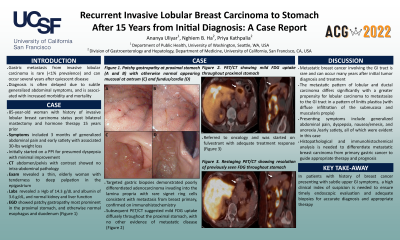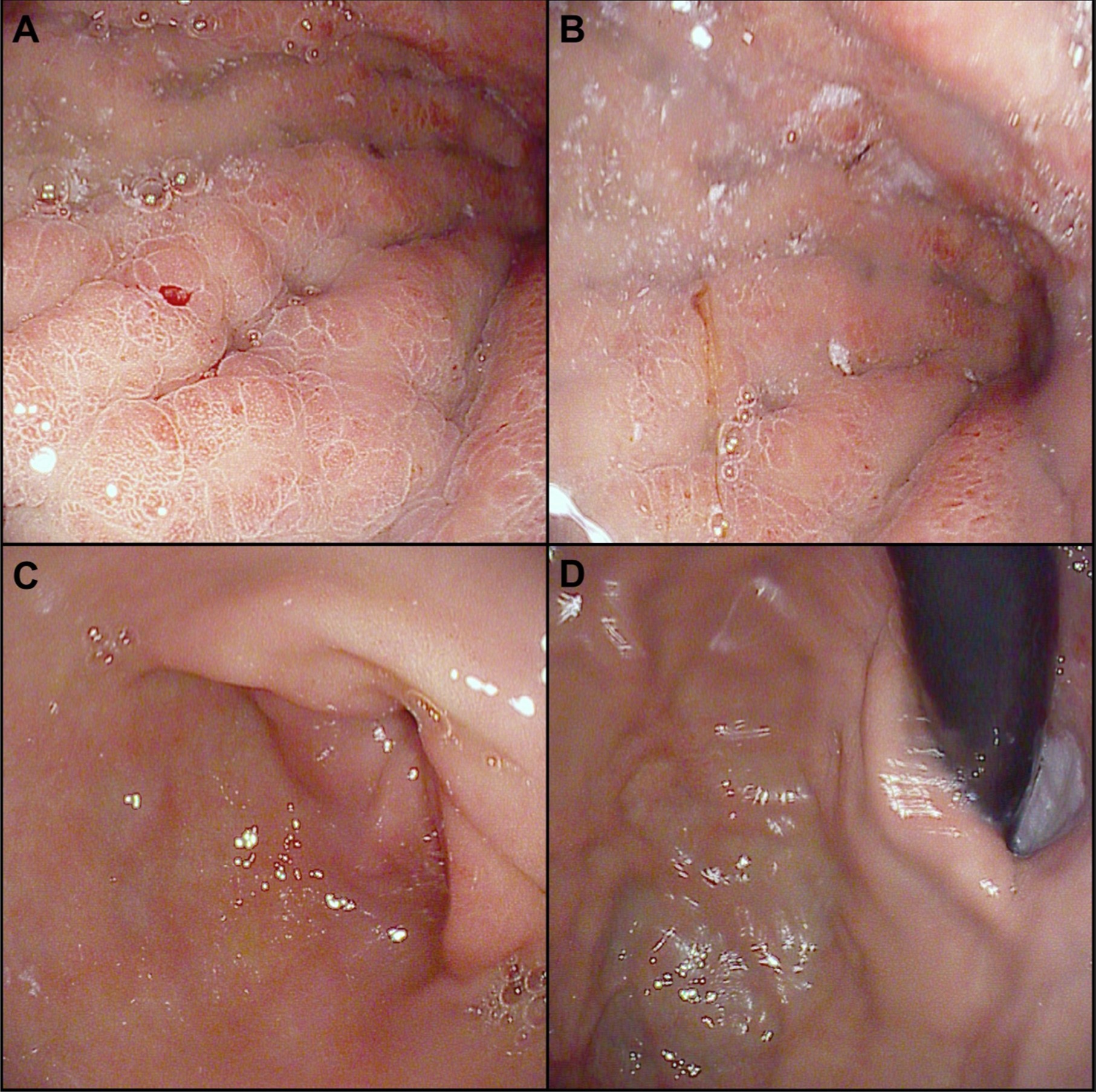Back


Poster Session D - Tuesday Morning
Category: Stomach
D0713 - Recurrent Invasive Lobular Breast Carcinoma to Stomach After 15 Years From Initial Diagnosis: A Case Report
Tuesday, October 25, 2022
10:00 AM – 12:00 PM ET
Location: Crown Ballroom

Has Audio

Ananya Uliyar, BS
University of Washington
San Francisco, CA
Presenting Author(s)
Ananya Uliyar, BS1, Nghiem B. Ha, MD, MAS2, Priya Kathpalia, MD2
1University of Washington, San Francisco, CA; 2University of California, San Francisco, San Francisco, CA
Introduction: Gastric metastasis from invasive lobular carcinoma is rare and can occur several years after quiescent disease; if symptoms are present, they often mimic dyspepsia, which can delay diagnosis and carries a higher rate of morbidity/mortality as a result.
Case Description/Methods: An 85-year-old woman with a history of invasive lobular breast carcinoma status post bilateral mastectomy and hormone therapy 15 years prior presented with 3 months of generalized abdominal pain and early satiety with 30-lbs weight loss. She was initially started on a proton pump inhibitor at an outside clinic for presumed dyspepsia with minimal improvement in her symptoms. CT scan was subsequently performed which revealed no intra-abdominal pathology. Exam revealed a thin, elderly woman with tenderness to deep palpation in the epigastrium. Labs revealed a Hgb of 14.3 g/dL and albumin of 3.6 g/dL, along with normal kidney and liver function. Her EGD showed patchy gastropathy that was most prominent in the proximal stomach, and otherwise normal esophagus and duodenum (Figure). Targeted gastric biopsies demonstrated poorly differentiated adenocarcinoma invading into the lamina propria with rare signet ring cells consistent with metastasis from breast primary, confirmed on immunohistochemistry. Subsequent PET/CT suggested mild FDG uptake diffusely throughout the proximal stomach, with no other evidence of metastatic disease. She was referred to oncology and was started on fulvestrant for recurrent invasive lobular carcinoma.
Discussion: Metastatic breast cancer involving the GI tract is rare with an estimated prevalence of less than 1% and can occur many years after initial tumor diagnosis and treatment. The metastatic pattern of lobular and ductal carcinoma differs significantly with a greater propensity for lobular carcinoma to metastasize to the GI tract in a pattern of linitis plastica (with diffuse infiltration of the submucosa and muscularis propria). Presenting symptoms include generalized abdominal pain, dyspepsia, nausea/emesis, and anorexia/early satiety, all of which were evident in this case. Histopathological and immunohistochemical analysis is needed to differentiate metastatic breast carcinoma from primary gastric cancer to guide appropriate therapy and prognosis. Therefore, in patients with a history of breast cancer presenting with subtle upper GI symptoms, a high clinical index of suspicion is needed to ensure timely endoscopic evaluation and adequate biopsies for accurate diagnosis and appropriate therapy.

Disclosures:
Ananya Uliyar, BS1, Nghiem B. Ha, MD, MAS2, Priya Kathpalia, MD2. D0713 - Recurrent Invasive Lobular Breast Carcinoma to Stomach After 15 Years From Initial Diagnosis: A Case Report, ACG 2022 Annual Scientific Meeting Abstracts. Charlotte, NC: American College of Gastroenterology.
1University of Washington, San Francisco, CA; 2University of California, San Francisco, San Francisco, CA
Introduction: Gastric metastasis from invasive lobular carcinoma is rare and can occur several years after quiescent disease; if symptoms are present, they often mimic dyspepsia, which can delay diagnosis and carries a higher rate of morbidity/mortality as a result.
Case Description/Methods: An 85-year-old woman with a history of invasive lobular breast carcinoma status post bilateral mastectomy and hormone therapy 15 years prior presented with 3 months of generalized abdominal pain and early satiety with 30-lbs weight loss. She was initially started on a proton pump inhibitor at an outside clinic for presumed dyspepsia with minimal improvement in her symptoms. CT scan was subsequently performed which revealed no intra-abdominal pathology. Exam revealed a thin, elderly woman with tenderness to deep palpation in the epigastrium. Labs revealed a Hgb of 14.3 g/dL and albumin of 3.6 g/dL, along with normal kidney and liver function. Her EGD showed patchy gastropathy that was most prominent in the proximal stomach, and otherwise normal esophagus and duodenum (Figure). Targeted gastric biopsies demonstrated poorly differentiated adenocarcinoma invading into the lamina propria with rare signet ring cells consistent with metastasis from breast primary, confirmed on immunohistochemistry. Subsequent PET/CT suggested mild FDG uptake diffusely throughout the proximal stomach, with no other evidence of metastatic disease. She was referred to oncology and was started on fulvestrant for recurrent invasive lobular carcinoma.
Discussion: Metastatic breast cancer involving the GI tract is rare with an estimated prevalence of less than 1% and can occur many years after initial tumor diagnosis and treatment. The metastatic pattern of lobular and ductal carcinoma differs significantly with a greater propensity for lobular carcinoma to metastasize to the GI tract in a pattern of linitis plastica (with diffuse infiltration of the submucosa and muscularis propria). Presenting symptoms include generalized abdominal pain, dyspepsia, nausea/emesis, and anorexia/early satiety, all of which were evident in this case. Histopathological and immunohistochemical analysis is needed to differentiate metastatic breast carcinoma from primary gastric cancer to guide appropriate therapy and prognosis. Therefore, in patients with a history of breast cancer presenting with subtle upper GI symptoms, a high clinical index of suspicion is needed to ensure timely endoscopic evaluation and adequate biopsies for accurate diagnosis and appropriate therapy.

Figure: Figure. Patchy gastropathy at proximal stomach (A &B) with otherwise normal appearing mucosal at antrum (C) and fundus/cardia (D) on esophagogastroduodenoscopy
Disclosures:
Ananya Uliyar indicated no relevant financial relationships.
Nghiem Ha indicated no relevant financial relationships.
Priya Kathpalia indicated no relevant financial relationships.
Ananya Uliyar, BS1, Nghiem B. Ha, MD, MAS2, Priya Kathpalia, MD2. D0713 - Recurrent Invasive Lobular Breast Carcinoma to Stomach After 15 Years From Initial Diagnosis: A Case Report, ACG 2022 Annual Scientific Meeting Abstracts. Charlotte, NC: American College of Gastroenterology.
